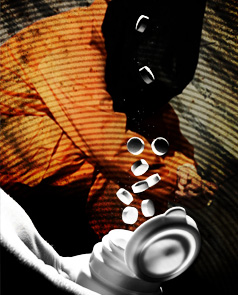 The Defense Department forced all "war on terror" detainees at the Guantanamo Bay prison to take a high dosage of a controversial antimalarial drug, mefloquine, an act that an Army public health physician called "pharmacologic waterboarding."
The Defense Department forced all "war on terror" detainees at the Guantanamo Bay prison to take a high dosage of a controversial antimalarial drug, mefloquine, an act that an Army public health physician called "pharmacologic waterboarding."
The US military administered the drug despite Pentagon knowledge that mefloquine caused severe neuropsychiatric side effects, including suicidal thoughts, hallucinations and anxiety. The drug was used on the prisoners whether they had malaria or not.
The revelation, which has not been previously reported, was buried in documents publicly released by the Defense Department (DoD) two years ago as part of the government's investigation into the June 2006 deaths of three Guantanamo detainees.
Army Staff Sgt. Joe Hickman, who was stationed at Guantanamo at the time of the suicides in 2006, and has presented evidence that demonstrates the three detainees could not have died by hanging themselves, noticed in the detainees' medical files that they were given mefloquine. Hickman has been investigating the circumstances behind the detainees' deaths for nearly four years.
Interviews with mefloquine and malaria experts and a review of peer-reviewed journals and government documents show there were no preexisting cases where mefloquine was ever prescribed for mass presumptive treatment of malaria.





 A Guardian analysis of government records has found that the vast majority – 77% – of...
A Guardian analysis of government records has found that the vast majority – 77% – of... In 1850, Andrew Benjamin Tarbutton enslaved 25 people in central Georgia. A year later, he purchased...
In 1850, Andrew Benjamin Tarbutton enslaved 25 people in central Georgia. A year later, he purchased... Arab and Islamic countries jointly condemned remarks by the US ambassador to Israel, Mike Huckabee, who...
Arab and Islamic countries jointly condemned remarks by the US ambassador to Israel, Mike Huckabee, who...






























